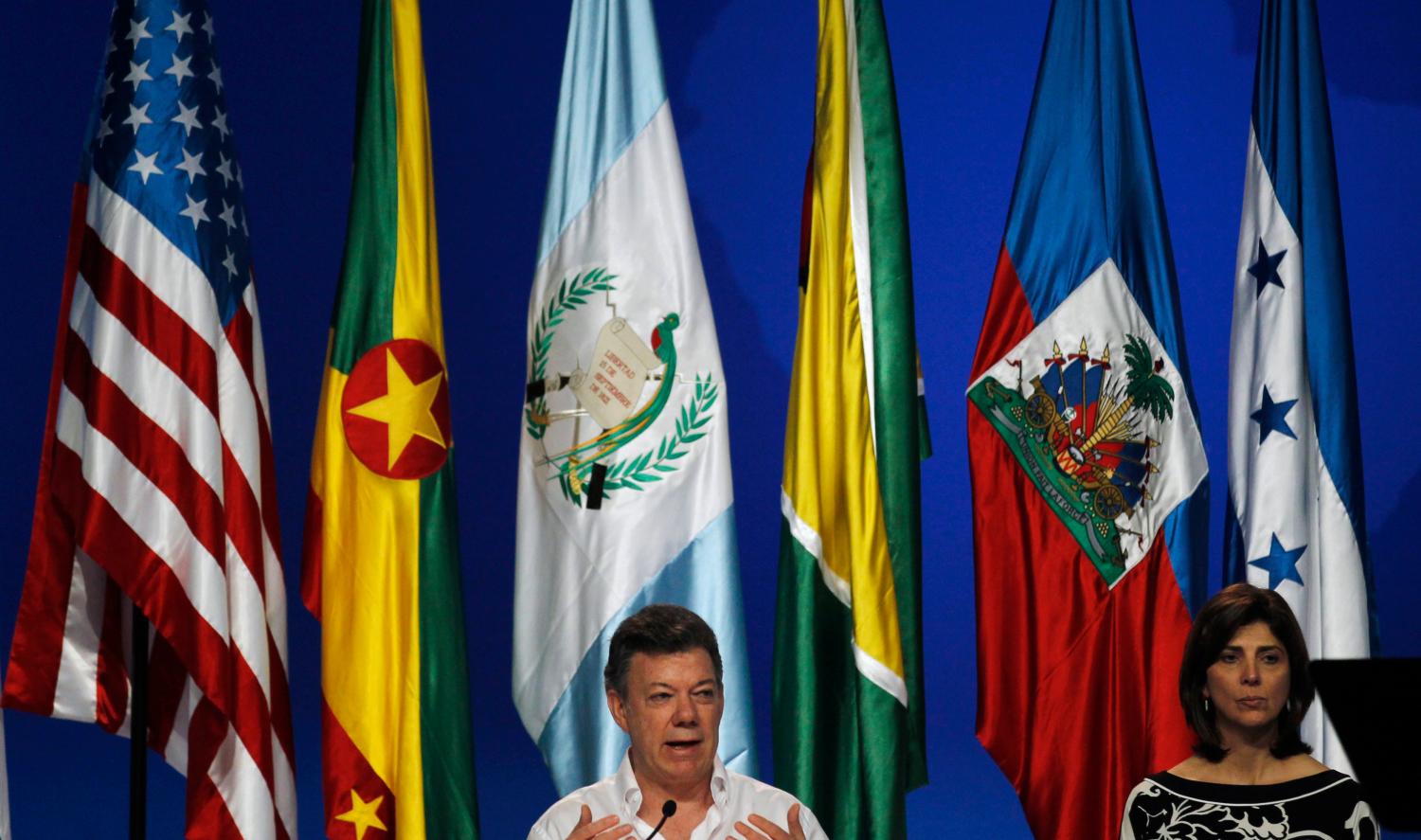For the United States, the tumult exhibited at this spring’s Sixth Summit of the Americas in Cartagena, Colombia was an unfortunate but increasingly common display of the shifting templates of contemporary inter-American relations. From the high point of the Miami Summit in 1994—when a convergence of historic transitions to democracy and more open economies gave birth to an ambitious hemispheric agenda of cooperation across multiple sectors—to the failure in Cartagena to reach agreement on a final declaration, plus an embarrassing scandal involving U.S. Secret Service agents, regional diplomacy has grown ever more fractious and deadlocked. The fragmenting poles of power and influence in the region—a rising Brazil, a combative alliance led by Venezuela, a weakened Central America bogged down by economic stagnation and criminal violence, a struggling Mexico adapting to global forces and a new president, and a distracted and despondent United States, not to mention the pull of new actors like China and the downcast eyes of old actors like Europe—translate into a frustrating competition for leadership and growing doubts about the usefulness of pursuing a hemispheric agenda.
At least that is how it looked from the headlines in Washington, which focused on the contentious debates around U.S.-Cuban relations, the “war on drugs,” and even the long-simmering Malvinas/Falklands dispute that marked the Cartagena gathering. These are longstanding and legitimate disagreements that deserve recognition and serious hemispheric diplomacy. But they should not stand in the way of other important business on the regional agenda, issues that range from economic innovation and trade to public security, education reform, and energy and climate change. These are the subjects that will determine whether countries of the region are able to move together into the 21st century as meaningful partners with a common vision for win-win solutions. They merit more attention and discussion in every capital of the hemisphere and at the heads of state level.
The Inter-American Democratic Charter: An Assessment and Ways to Strengthen It
The ongoing and increasingly polarized debate around the
region’s shaky commitments to democracy and human
rights are well addressed in Dr. Perina’s thoughtful paper.
In addition to the examples he offers, further evidence can
be found in the decision of the OAS General Assembly in
June to consider a raft of proposals to weaken the inter-
American human rights system. These are important signals
of change in regional politics and diplomacy. First, they
connote a growing sense of self-confidence on the part of
some leaders that they can handle their internal human
rights problems on their own. Indeed, some even reject the
basic principle of external scrutiny of their adherence to
legal and political instruments they’ve endorsed. Second,
they demonstrate the solidarity among the ALBA states to
exploit certain decisions of the Inter-American Commission
and Court on Human Rights as a wedge between Washington
and the rest of the region. And third, it suggests the
moral, if not always legally enforceable, power of these institutions
to pressure governments to improve their human
rights records remains effective.
Downloads:
Introduction
For the United States, the tumult exhibited at this spring’s
Sixth Summit of the Americas in Cartagena, Colombia was
an unfortunate but increasingly common display of the shifting
templates of contemporary inter-American relations.
From the high point of the Miami Summit in 1994—when a
convergence of historic transitions to democracy and more
open economies gave birth to an ambitious hemispheric
agenda of cooperation across multiple sectors—to the failure
in Cartagena to reach agreement on a final declaration,
plus an embarrassing scandal involving U.S. Secret Service
agents, regional diplomacy has grown ever more fractious
and deadlocked. The fragmenting poles of power and influence
in the region—a rising Brazil, a combative alliance led
by Venezuela, a weakened Central America bogged down
by economic stagnation and criminal violence, a struggling
Mexico adapting to global forces and a new president, and
a distracted and despondent United States, not to mention
the pull of new actors like China and the downcast eyes of
old actors like Europe—translate into a frustrating competition
for leadership and growing doubts about the usefulness
of pursuing a hemispheric agenda.
Downloads:
Fostering a Culture of Innovation in the Americas
Dr. Bustillo provides a very good review of the state of technology
and innovation in the region—issues that are critical
to the economic future of Latin America and the Caribbean.
The paper is an enlightening contribution to the usual discussion
of economics in the region, and highlights one of
the key economic factors that countries in the region must
grapple with if they are going to attain competitive and sustainable
growth.
Downloads:
Economic Integration in the Americas: An Unfinished Agenda
This is a very informative paper that reviews the state of play
on the trade integration and free trade agreement agenda in
the region, and is a worthwhile read. As in the case of the
discussion of technology and innovation, it is important not
to treat the region as a homogenous entity when it comes
to trade; there are very large differences across countries.
Downloads:
Education in the Americas: What the Summit Missed
This comprehensive and excellent survey of education in
Latin America stresses the importance of systemic problems
that result in growing inequity, rising levels of youth
violence, and persistently low levels of citizen education.
The failure of the Cartagena Summit to adequately address
the challenge of education does not dilute the national challenges
that each leader faces back home. Poor-quality education
from teachers who are inadequately paid, trained
and supervised has resulted in students from the hemisphere
registering the lowest performance levels on the
Programme for International Student Assessment (PISA)
reading and math scores. Beyond the testing of students
in third and eighth grades, the authors extend their analysis
to the performance of the region’s universities. In the 2011-
2012 ranking of the world’s 400 top universities, no Latin
American university ranked in the top 100. Less than onequarter
of all university graduates receive science or engineering
degrees and even fewer receive doctorates. Brazil
produces only one doctoral graduate for every 70,000 people.
Chile produces one for every 140,000. This compares
to an OECD average of one per every 5,000 people.
Downloads:
Promoting Energy Security and Tackling Climate Change: Missed Opportunities at the Cartagena Summit
The author’s history of hemispheric initiatives on energy
and climate change leaves readers with the question of why
sustained pronouncements at the summit meetings since
1994 had continually failed. Examination of the causes of
failure might focus on the following: the absence of hemispheric
homogeneity, growing resource nationalism, and
lack of sufficient hemisphere-wide financial resources. OAS
will not solve the key challenges of advancing energy security
and combating climate change, because it has neither
the juridical competence nor the funds to oblige the
member states to carry out the repeated recommendations.
Summits of the Americas are useful as a gathering of hemispheric
leaders, during which time several bilateral meetings
can take place—but they should not raise hopes for
realistically solving serious problems. We should view the
summits as rhetorical opportunities for advocacy, not vehicles
for advancing pragmatic action.
Downloads:
Public Security Challenges in the Americas
Kevin Casas-Zamora and Lucía Dammert are right to call for
a comprehensive approach to fighting crime in Latin America.
The need to incorporate well-designed socio-economic
approaches into anti-crime strategies applies not only to policies
toward social phenomena such as Latin American youth
gangs, but also to fighting organized crime. This is because
large populations in Latin America in areas with inadequate
or problematic state presence, great poverty, and social and
political marginalization continue to be dependent on illicit
economies, including the drug trade, for economic survival
and the satisfaction of other socio-economic needs. For
many, participation in informal economies, if not outright illegal
ones, is the only way to assure their human security and
provide any chance of their social advancement.
Downloads:
The Summits of the Americas and the Inter-American System
Aparicio-Otero’s rich essay raises the key questions
about summitry and the inter-American system. Let me
comment briefly on three important issues: summit organization;
the increasingly successful incorporation of civil
society and the private sector; and the deeply divisive
issue of Cuban participation.
Downloads:
The Brookings Institution is committed to quality, independence, and impact.
We are supported by a diverse array of funders. In line with our values and policies, each Brookings publication represents the sole views of its author(s).



